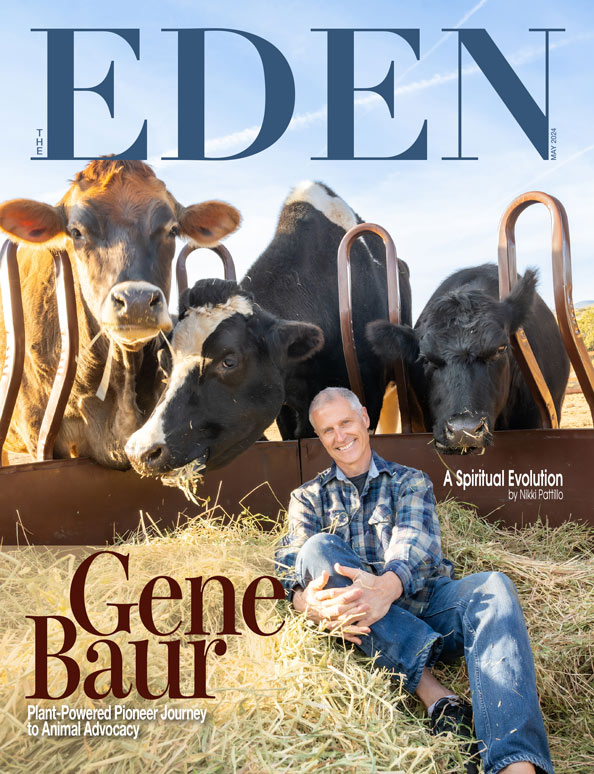
Gene Baur
An Author of Farm Sanctuary and Activist in the Animal Rights and food movement, Gene Baur is a pioneering advocate for animal welfare, sustainability, and veganism. As the co-founder of Farm Sanctuary, he has dedicated his life to promoting compassion for farm animals and raising awareness about the ethical and environmental implications of factory farming. Gene continues to inspire individuals worldwide to make more compassionate choices for animals and the planet through his activism, writing, and public speaking engagements.
Read Our Magazine…
Gene Baur, a leading figure in the animal rights movement, has left a significant mark through his writings. His books, including Farm Sanctuary: Changing Hearts and Minds About Animals and Food and Living the Farm Sanctuary Life, delve into the ethical, environmental, and health-related aspects of veganism and animal welfare. Gene’s profound insights and experiences shared in his writings empower readers to make informed choices that align with their values, extending his mission to promote a more compassionate and sustainable world for all beings.
Can you share the inspiration behind founding the Farm Sanctuary and how it has evolved over the years?
One of our most important values at Farm Sanctuary is to speak to people where they are on their journeys. We need to be able to talk to many folks from different backgrounds, including farmers, and have empathy and understanding for why they may do what they do or believe what they believe.
I’m a vegan activist who has been vegan since 1985. I enrolled in the agriculture department at Cornell University and took animal science classes. I was in classes with students who learned things and were indoctrinated to believe certain things.
I found it to be abhorrent, but I was able to understand how people come to accept bad things as normal and then begin to justify and rationalize cruel behavior. It was eye-opening.
Going to Cornell, taking animal science classes, and taking agricultural economics classes helped me to understand the culture and belief system and understand, to the best of my ability, how we can reach these folks and find common ground toward building a food system that is good for humans, as well as other animals on the planet. It is important to understand the perspectives of others, especially those who have different perspectives from mine.
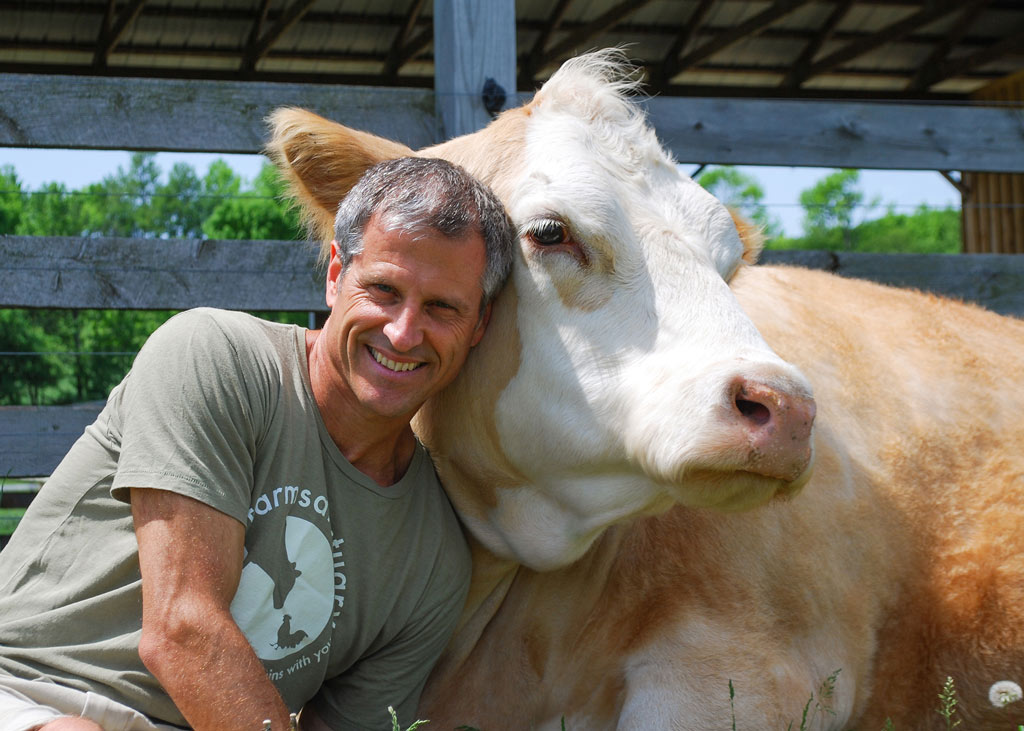
What challenges have you faced in running a sanctuary, and how have you overcome them?
Farmers have come up with a system where they believe we need to use animals for food production. What we’re trying to do now at Farm Sanctuary is to demonstrate that we can produce food without exploiting animals.
In our sanctuaries, the animals are our friends, not our food. It’s beautiful to watch these animals recover from the abuse they experienced in the factory farming system and begin to enjoy life, play, and frolic. When we watch these other animals experience joy, it brings joy to us. And if you contrast that feeling, that experience, and that interaction with what it’s like to be in a slaughterhouse where the animals don’t want to be there, they’re stressed. They’re ultimately killed, and the people who work there are also stressed and doing things that are violent and bloody. Slaughterhouses are not only bad for cows and pigs and chickens and turkeys and other animals; I believe they are bad for people. So, each of us must make our own choices, but we should recognize that we have the option, in many cases, to choose a more compassionate way of living. Each of us has to make our own choices. I can’t tell others how they must or must not live.
Most of us, including myself, grew up eating animals without thinking about it. But as time passed, I recognized that I could live well without eating animal products. And I thought, if I can live well without causing unnecessary harm, why wouldn’t I?
I encourage people to make good choices and align with their values. Too often, when I bring up the issue of factory farming, people say, “Don’t tell me. I don’t want to know.” If we’re supporting this industry, we must be aware of that and ultimately act in a way that we can hopefully feel good about.
We certainly don’t want our pets to be our meals and feel the same about farm animals. What makes a domestic animal different than a farm animal? They should be treated the same. But as long as people keep eating meat, there will be farming. In your opinion, how can we manage this situation?
There are many parts to this. It isn’t easy. First, we must acknowledge that we have a choice and can decide if we want to or don’t want to buy and consume animal products. So many consumers can make those kinds of choices, but we have to challenge this myth that we have to eat meat for strength and we have to drink cow’s milk for calcium. Those are absolute myths.
We must start investing in a food system that makes healthy plant foods much more accessible.
Right now, the U.S. government and other governments spend billions of dollars to promote animal agriculture, to promote the excess production of cow’s milk, for example. When we have all this extra milk, it goes into the school lunch program, and the government buys it and then uses that program ultimately.
We need to look at the systems in place and start investing in different kinds of systems that ultimately serve our interests as consumers because eating too many animal products the way we do today is contributing to heart disease, diabetes, and some forms of cancer.
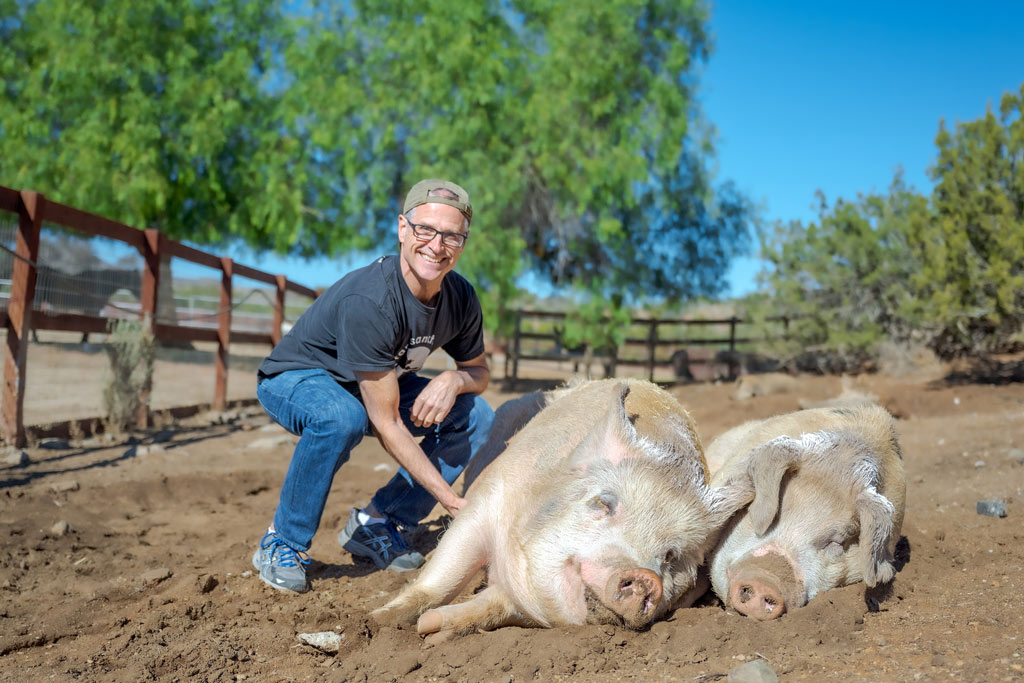
Shifting to a whole-food, plant-based diet could save 70% on healthcare costs. The way we eat is hurting us and making us sick. Unfortunately, the government is subsidizing a food system that is harmful not only to us and other animals but also to the Earth.
In our country, ten times more land is used for animal agriculture than plant-based agriculture. We can feed more people with less land and fewer resources by shifting to plant-based agriculture, which means we can create more wildlife habitats, ecosystems, and biodiversity. A survey was done looking at mammals living on Earth a few years ago, and they found that of all mammals living on Earth today, only 4% live in the wild, 96% are domesticated, humans and mainly farm animals.
It’s because animal agriculture has such a massive presence and footprint. The more animal products consumers eat, the more wildlife and natural spaces are being taken up to grow corn and soybeans for animal feed or for grazing farm animals.
This system is immensely destructive and a significant contributor to the climate crisis. It is a harmful industry, and most people unwittingly support it.
First, people must be aware of the consequences—the impacts—of their food choices. Then, ideally, as I mentioned, they should make food choices aligned with their values and interests. And if people did that, we would see a revolution.
You run triathlons and demonstrate to yourself and others that you can be in peak physical health. Is it something that you did to demonstrate that being vegan is the path? Or was it just a personal challenge you did for yourself?
Yes, I went vegan when I was in my 20s in 1985, and I’ve been vegan for many years.
One of the arguments we often hear is that vegans don’t get enough protein or other nutrients. As a long-time vegan, I was getting everything I needed to be able to run marathons, and I did an Ironman triathlon and an ultramarathon. However, elite athletes also perform at the highest levels on a plant-based diet. People like Scott Jerick, legendary ultramarathon runner, did that as a vegan, winning many races.
Harvey Lewis is another elite runner, winning Badwater 135 and other significant ultra-races
as a vegan. The only U.S. male weightlifter to qualify for the Olympics in Rio a few years back
is a vegan. So, it’s not only athletes but also strength athletes who are getting everything they need by eating plants instead of animals.
Now, you know, I did some things again, but it’s not quite what some of these other athletes are doing. But it shows that you can get everything you need. You can perform at the highest level, eating plants instead of animals.
You were a guest on Tony Robbins’ blog. Was there an inciting moment in your life where you decided that this is the path you want to take?
I grew up in Hollywood, California, and as a kid, I did extra work. Believe it or not, I was in the background in McDonald’s commercials, so I didn’t recognize what I was contributing to through my dietary habits and some of the work I was doing when I was younger.
I grew up in the 1960s and 1970s; I saw many disturbing things around me.
There was the threat of nuclear war. There was environmental destruction. I saw wild animals being hit by cars and being harmed by human development and activities, and I felt that I didn’t want to be part of a system that was causing so much harm.
So, from high school, I started exploring what I could do to live more compassionately and less harmfully. I first learned about how veal calve are raised. When I was in high school, my grandmother told me that these baby calves were taken from their mothers and chained by the neck in crates for their whole lives. I said I’d never eat veal.
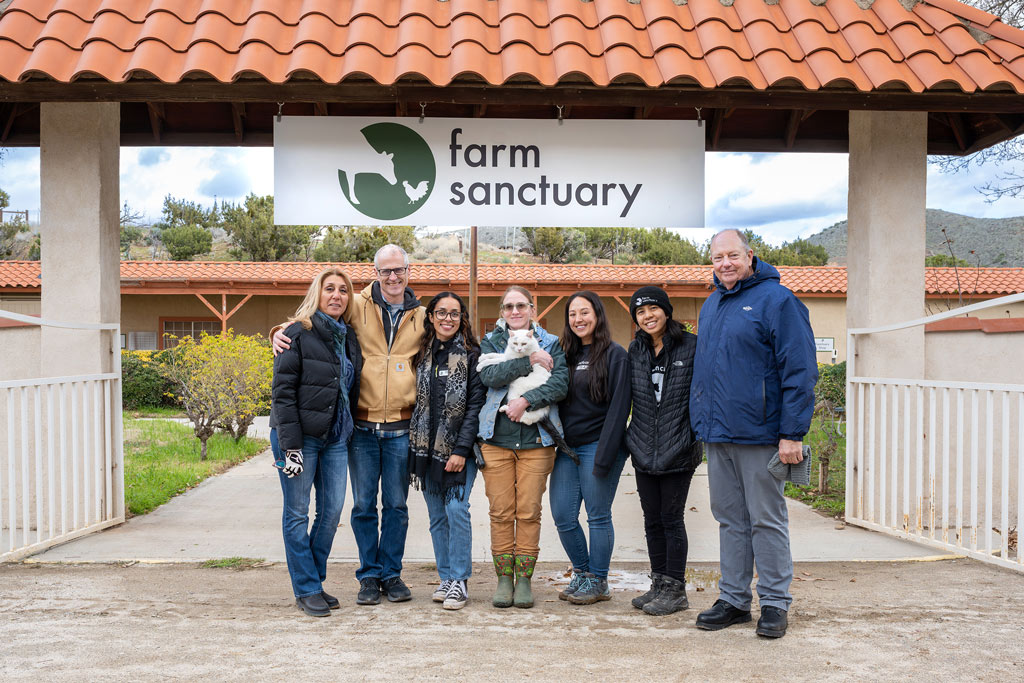
Then, in college, I learned more about the environmental consequences of animal agriculture, how inefficient it is, how harmful it is, and, again, how cruel it is to animals and workers, and how our health is suffering.
Then, when I finally learned that it was possible to live well without being part of the system and without eating animal products, I went vegan. Once again, that was in 1985.
In 1986, I co-founded Farm Sanctuary and started investigating factory farms. I saw firsthand how bad the conditions were, which cemented my commitment to this lifestyle. I believe this system is harming everybody, and we can play a role in changing it.
The founder of The Eden Magazine, Maryam Morrison, visited one of your farm sanctuaries outside Los Angeles and said it was magical. Are you planning to have other farm sanctuaries throughout the United States? What are people going to learn when they visit?
As you mentioned, Farm Sanctuary operates sanctuaries in New York and California, just outside Los Angeles. In addition to us, there are hundreds if not thousands of farm sanctuaries across the country and around the world.
We are collaborators; we work with our colleagues to create experiences where people can get to know a cow or a pig, a chicken, a turkey, or another animal who was seen as a piece of meat before coming to a sanctuary.
Earlier, you mentioned how many of us live with cats and dogs, which are part of our family. But at the same time, people often say they’re animal lovers, but at the same time, they’re eating other animals. I think it can be somewhat sobering to recognize that in some countries, they eat cats and dogs, but in some countries, they don’t eat cows, or they don’t eat pigs. So, which animals we eat and which ones we see as companions are quite arbitrary distinctions. The bottom line is that we can live without killing or eating any of them. Still, in our sanctuaries, people can interact with a cow like they might interact with a dog. People can go up and pet them. Pigs love belly rubs, so often you’ll walk up to a 500-pound pig and touch their belly, and because they’ve been at the sanctuary for a while, they recognize getting a belly rub, and they do flop over on their side for a belly rub. Animals who’ve been at the sanctuary for a while become familiar with people; they come to trust people and recognize that human beings are going to be kind to them and seek out our company, which is an evolution.
Do you have any collaborations or partnerships that have been significant and to spearhead the type of work that you’re doing?
Yes, we work with various members of Congress to advance legislation that will limit the harms of animal agriculture and promote a healthier plant-based food system.
We work with environmental groups, farmer groups, and frontline food worker organizations. So, we seek to build a broad coalition of animal rights organizations, human rights organizations, social justice organizations, and environmental organizations that share the same interest in creating a healthier food system. We collaborate with a diverse number of individuals and organizations within the animal rights movement and far beyond it.
And our goal is to create solutions. Historically, our work has focused on the problems with factory farming. We’ve also worked to pass laws to end some of the worst cruelties, such as keeping animals in cages and crates where they can’t turn around or move.
We’ve been able to ban some of that cruelty in several states, but we also need to build solutions.
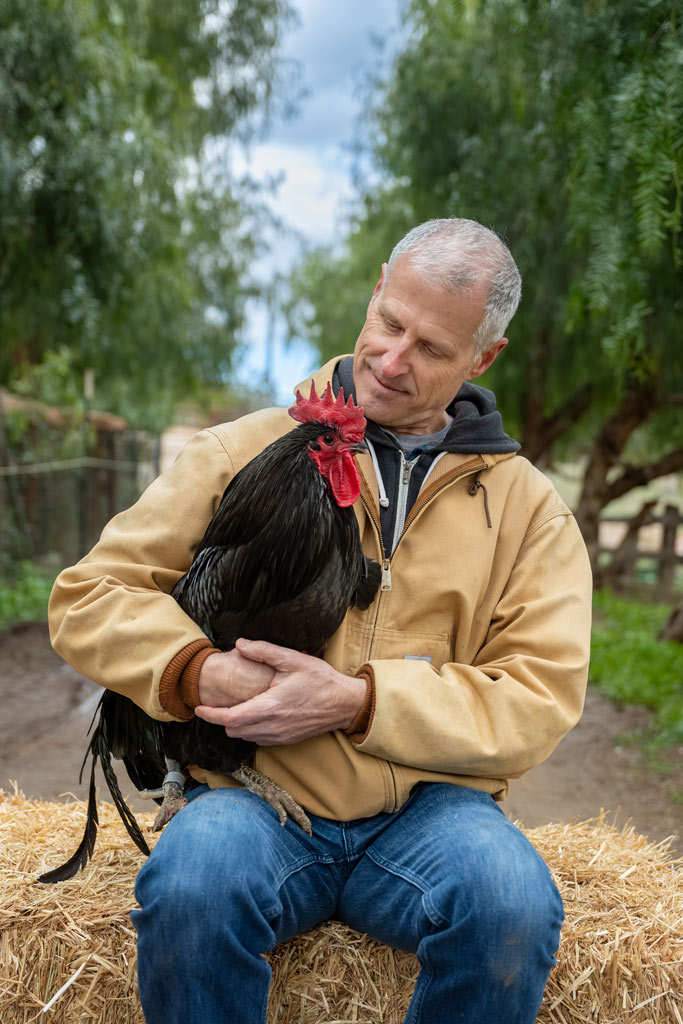
One of the things we’re focused on now is taking a resource-based approach to system change. So, resources are things like government programs, which cost billions of dollars. Suppose we can get those billions of dollars out of factory farming and invest instead in plant-based agriculture, local food systems, and healthy, community-oriented agriculture. In that case, that is a much better investment. That’s one of the system-oriented approaches we’re taking. Another resource is land. And as I mentioned earlier, the vast majority of land in the U.S. is used for animal agriculture. Government programs have incentivized it to grow corn, soy, and other feed crops. We need to incentivize farmers to grow fruits, vegetables, legumes, and healthy crops that will be sold directly to consumers instead of for animal feed.
That’s another significant effort we’re in the midst of. We’re also creating agricultural programs that help sequester carbon in the soil and combat the climate crisis.
Right now, our system is creating enormous amounts of greenhouse gas Emissions. Shifting to plant-based agriculture and engaging in more sustainable farming practices can also create opportunities for farmers to receive conservation dollars from the systems, and healthy, community-oriented agriculture. for doing the right thing, protecting the environment, and producing food without harming us. We have several things we’re doing, but they are all rooted in this resource-based approach to system change.
What inspired you to write your book or speak about what is happening behind those closed doors, and how does it align with your mission and advocacy for farm animal rights?
The key part of our message is to say that farm animals, like other animals, matter. They have lives. They want to enjoy their lives. They each have one life to live. And it’s tragic the type of violence and abuse they experience at a massive scale.
It’s hard to wrap our heads around how massive this problem is. In the U.S, nearly 10 billion farm animals are raised and slaughtered annually. That is more individuals than there are human beings who live on Earth. And we’re killing that many every year in the U.S. If you go global, it’s even more. And
if you include fish, the numbers are in the trillions. So, this is a massive, harmful industry, hurting individual animals, hurting the environment, hurting our health, hurting communities, hurting farming communities. I want folks to be aware of the negative impacts of this system, but I also want people to feel empowered and have hope that they can make a difference. Part of that is helping the Farm Sanctuary care for the animals at our sanctuary. That’s one way.
We can also play a role with our fork daily and choose not to buy products from this factory farming system. Each time we make a conscious choice that is more compassionate, it empowers us to make more choices and take more steps to live more compassionately.
Change usually happens incrementally, so we support things like Meatless Mondays, where, for instance, one day a week, people go meatless. Isn’t that wonderful? Sometimes, that leads to meatless Tuesdays and then meatless Wednesdays, but you have to start somewhere.
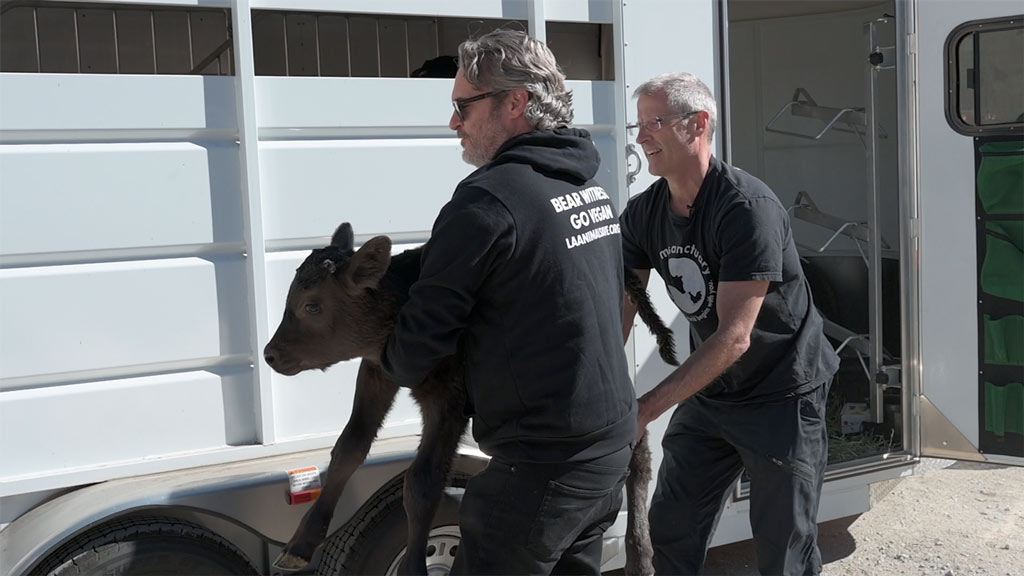
I support every step toward living kindly and withdrawing our support from an industry that causes so much harm.
Different people will approach this in various ways. For some, it will involve getting to know individual animals, whether they’re cows, pigs, chickens, or whatever they may be.
For some people, it will be concern about the climate. And they don’t want to support an industry causing so much harm to our planet and the climate.
For some, the loss of biodiversity will be a concern. Others, it will be their health or concerns about the way workers are abused, or children are abused working in slaughterhouses.
There are so many reasons that we should care about this issue. Each person’s going to come to it in their own way.
A big part of what I try to explain is the impacts of our food choices and ultimately empower people to make better choices for themselves, other animals, and the planet.
Has there been a moment where you’ve reached a dark place in your life where you said I can’t do this anymore? I feel hopeless. What’s the point? And if so, what pushed you to continue plowing through this massive issue that takes more than a village and a few billion people to overcome?
Yes. I have seen a lot of horrible things. Instead of focusing on what I can’t do and dwelling in pain and despair, I can continue doing this work. I look at what I can do and get hope from that.
This is where celebrating small victories helps one cope with the massive problems we’re addressing. You have to take it step by step, do what you can, and then dwell on the success, the hope, and what you can do and feel empowered by it.
This is my mission. The industry and the system are causing such tragedy. And it needs to be addressed. And I will continue addressing it to the best of my ability.
Are there actionable things beyond what we eat that parents can do for their kids to help them become more active in this issue and create a lasting change?
We live in a democracy where voting and involvement in the process matter. So, showing up is essential, whether it’s a demonstration and protest or whether it’s reaching out to your elected officials or getting involved, even at your school, to encourage the school to have more plant-based foods in the cafeteria. Speaking out about what is important, the younger generation is rightfully concerned about the state of our planet, the climate crisis, the loss of biodiversity, and the threats we’re all facing.
People can get involved with Farm Sanctuary through our website, FarmSanctuary.org. We have internship and volunteer programs, and we love for people to get involved and play a role in trying to create a more compassionate, healthier, and more just world.
What are the most pressing issues regarding farm animal rights, and how can individuals contribute to positive change?
People can donate to our website, FarmSanctuary.org, and any contribution is much appreciated. Interacting with animals at the sanctuary can also be a magical and transformative experience. It is an essential way for people to connect and to recognize that we share this world with other animals. Often, factory farms hide animals from public view. Ag-gag laws are being enacted to prevent consumers from seeing how farm animals are mistreated.
So, visiting the sanctuary, learning the animals’ stories, looking into their eyes, and seeing that they’re not that different from our cats, dogs, or even humans; a pig’s eyes look a lot like a human’s eyes.
These animals are individuals, and when we get to know them, our empathy grows. Empathy is an essential part of our humanity, and the more disconnected we are from others and the more we mistreat others, the more likely we are to rationalize our mistreatment of others and often denigrate the victims of our cruelty. There are subtle ways that this happens every day, and we don’t even think about it. Calling somebody a pig, for example, is a put-down, and it’s also a way to put down the pig inherently, or calling somebody a turkey is also a put-down. These are subtle ways we denigrate the victims of our cruelty, and they enable us to continue to lose our empathy. And when we lose our empathy, we’re in trouble. We need empathy more than anything today.
Hollywood is one of the primary sources that can impact the public’s mind. In your opinion, how can Hollywood contribute with its storytelling to advocate for everything that you Gene stands for, but also foreign sanctuary stands for?
Hollywood plays a significant role in influencing how people see the world. Incorporate more messages of kindness and responsibility and act humanely and kindly.
It is very helpful to model that through different characters or tell stories about transformation and how human beings can live kindly and generously.
Creating positive examples for people is something that Hollywood can play a vital role in doing.
Also, I think exposing the violence and the cruelty of animal agriculture, although that’s going to appeal to a different audiences differently, is important.
I would probably think that you have a meditation or spiritual practice that connects you to the sense of empathy, or in better words, what do you do to keep yourself centered and together through all the ups and downs in life?
I remember what’s important: breathe, recognize that I’m lucky in many ways, practice gratitude, and live in gratitude, as difficult as things may be from time to time.
There are also responsibilities. I want to do everything I can within my power and within my means to create a kinder world. And that’s my purpose, my drive, and you can put up with a lot when you have a purpose.
Please tell us how you would define yourself in three words. Do you have any life mantras?
I am doing my best or trying my best, constantly learning, trying to grow and evolve. In terms of a mantra, there’s the serenity prayer. Lord give me the strength to change the things I can, the serenity to accept the things I can’t change, and the wisdom to know the difference. I do my best and recognize that there’s a lot outside my control. Human beings need to remain open-minded and humble because none of us has all the answers. We need to grow and learn and listen constantly, and often, we need to listen to those who have very different ideas from ours.
Special Thanks to:
Gene Baur
All the volunteers at Farm Sanctuary
Editing: Dina Morrone
Photography: Denise McCarthy
Videography: Meg Weck

Comments